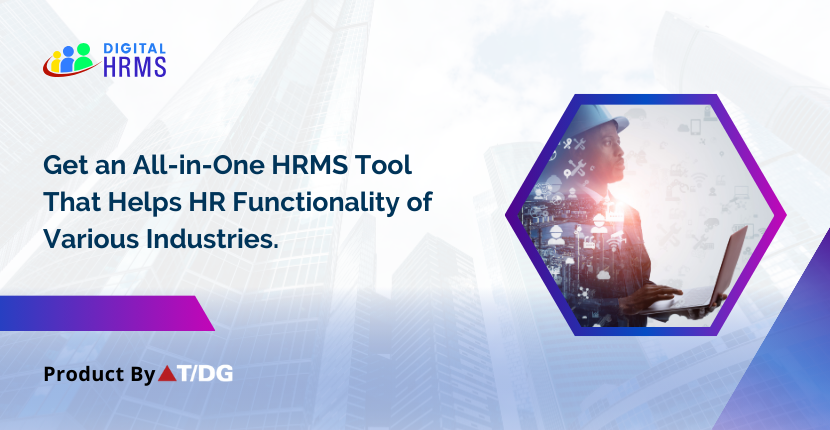Streamline HR Functions for Various Industries Through Digital HRMS Software

What is HRMS Software for Various Industries?
HRMS or HRMS system is a software package used to manage human resources and related activities in an employee's life. HRMS helps a company better understand its employees while complying with tax laws and employment regulations. Managers and HR teams are the primary users because they are responsible for day-to-day HR activities and compliance and reporting through an HRMS platform. But HR isn't the only department benefiting from this. The company can empower managers and employees with personalized services to the public, which is a key selling point for young employees. Managers can use HRMS to provide information about their employees and their company. Considering that HR-related costs are one of the company's largest expenses, the integration of HRMS platform and accounting system is ideal for the finance team. Leading providers will go beyond basic accounting to help companies make their HR data financially transparent.

When evaluating which HRMS is best suited to your industry, it is best to think in terms of operational processes. Normally the modern system contains important components with different concentration levels making an all in one HRMS tool. Below are few important features of HRMS software for various industries to consider
Candidate Management: It's about recruiting candidates and how to promote your brand to permanent employees who may want to apply or refer them, both internationally and internally. It is important for companies to provide a one-stop service for the candidate experience: from the application process, to the interview process, to the interview process and the recruitment process with the HRMS software for various industries.
Employee Engagement: People with high engagement tend to do better work and are more likely to embrace the company's values and implement its vision. HRMS is often a way to complete an education, gain new skills, develop a career, gain recognition or become a mentor.
Payroll: Calculating income on a gross-to-net or net-to-gross basis and deducting personal taxes and making payments can be done in the usual way, such as paying rent. The full payroll service also offers tax and deposit services. This is a major feature of HRMS software for various industries.
Employee Performance Evaluation: This program was created, including goal management: It is related to the management of primary and important personnel in companies where not every employee is permanent.
Self-Service: Self-service functionality of HRMS software for various industries allows employees to make changes to payroll, direct deposit accounts, and withholding taxes and other helps without HR assistance.
But, mostly the following are the common industries and below are their specific requirements of HRMS software for various industries
1. Manufacturing Industry:
Significance-
Both white-collar and blue-collar employees are critical to the manufacturing sector's success. In order to manage hiring, payroll, attendance, and compliance, all in one HRMS tool is essential.
Important Features:
- Cost Analysis: HRMS platform facilitates data-driven decision-making by assisting in the analysis of production costs, including payroll expenses for manufacturing industry.
- Work Culture: It fosters a supportive atmosphere that increases teamwork and employee engagement.
- Performance Management: Monitoring worker output guarantees the success of the company as a whole.
2. The Healthcare Industry:
Significance-
The healthcare industry faces issues with staff fatigue, compliance, and a lack of talent. HRMS can help with these problems.
Important Features:
- Talent management and recruitment: HRMS ensures the engagement of qualified experts by streamlining the recruitment process in the healthcare industry.
- Data-Driven Decisions: HRMS offers information that improves resource allocation and workforce planning.
- Candidate Experience: The applicant experience is improved by smooth recruitment procedures.
3. IT Industry:
Significance-
Technical proficiency, inventiveness, and workforce experiences are critical to the IT industry's success. For the management of human resources, HRMS is crucial.
Important Features:
- Onboarding and Recruitment: HRMS streamlines the process of finding, vetting, and onboarding candidates.
- Performance Tracking: HRMS keeps an eye on worker performance to guarantee growth and productivity.
- Digital Transformation: HRMS is compatible with the tech-driven environment of the industry.
4. Education Industry:
Significance-
An all in one HRMS tool improves productivity, learning, and staff supervision in the education industry.
Important Features:
- Attendance Management: HRMS makes it easier to track teachers' attendance while guaranteeing correct documentation for education industry.
- Learning and Development: An HRMS's Learning Management System (LMS) facilitates educators' ongoing professional growth.
- Efficient Communication: Internal chat platforms help teachers communicate with each other.
5. Automobile Industry:
Significance-
The automobile industry needs a positive work culture and has issues with cost analysis.
Important Features:
- Cost Analysis: HRMS assists with monthly cost calculations, enabling well-informed decision-making by the automobile industries.
- Work Culture: Encourages a happy atmosphere and increases staff involvement.
- Performance management: Monitors employee performance to improve results.
6. Recruitment Agencies:
Significance-
Candidate management and effective procedures are the lifeblood of recruitment agencies.
Important Features:
- Sourcing and Screening: HRMS streamlines the process of finding candidates and analyzing resumes for screening by the recruitment agencies.
- Pipeline Management: Places applicants through the placement process quickly and effectively.
- Data Utilization: Successful hiring is enhanced by insights derived from data.
7. Media Industry:
Significance-
The media industry includes television, radio, print, movies, and social media. HRMS makes personnel management more efficient.
Important Features:
- Digital Transformation through Resource Management: Resource Allocation and Management becomes methodical and easily accessible when HRMS digitizes HR procedures of the media industry.
- Innovative Trainings: Employer-focused features are provided by HRMS, just as training management.
- Performance Management: Monitors employee performance to improve results.
In conclusion, Digital HRMS which is an all in one HRMS tool helps industries by guaranteeing compliance, streamlining procedures, and improving employee satisfaction across a range of sectors as a HRMS software for various industries. The success of an industry, regardless of its type—manufacturing, automobile, healthcare, IT, education, or media, retail, pharma, government and many more, is greatly impacted by its all in one HRMS tool - Digital HRMS. Discover more about Digital HRMS software for various industries in our website at www.digitalhrms.com or send us an email at marketing@digitalhrms.com, and we will contact you. Get full free trial access to Digital HRMS for the next 90 days. Available for a limited time Only!